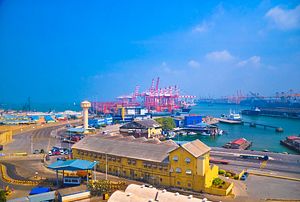In the latest twist in the saga of China’s would-be $1 billion port project in Sri Lanka, Colombo has put the project on hold while it undergoes a review process. Xinhua highlights the plight of the Chinese company involved, China Communications Construction Company, which reports losing $380,000 each day the project is delayed. The company also says that already completed construction on a breakwater is being damaged, as CCCC is not permitted to do additional work to protect the site from the elements. The port project has been suspended while the Sri Lankan government reviews it.
In other news, David Shambaugh’s piece, “The Coming Chinese Crackup,” is continuing to spark heated responses – both in China and in the international China-watching community. ChinaFile gathers a number of perspectives in the latest “ChinaFile Conversation.” Most of the experts interviewed disagreed that China (or, more accurately, the Chinese Communist Party) is about to “crack up.” The general consensus is that China is in the middle of a crisis period, but the Party leadership is well aware of this and working hard to ensure a soft landing for China.
Providing a Chinese perspective on the conversation, Chen Weihua of China Daily accuses Shambaugh of “bias” and lumps him together with the long tradition of unfulfilled predictions about China’s collapse. It’s a longer (and harsher) version of the contribution Chen made to the ChinaFile conversation.
Reuters reports that fewer and fewer U.S. students are interested in studying Chinese, whether in China or at U.S. universities. According to the Institute of International Education, the number of U.S. students studying in China fell 3.2 percent in 2012-2013, despite an increase in the overall number of study abroad participants. According to data in the article, China studies grew rapidly in the mid to late 00s, coincidentally around the time of the Beijing Olympics. Post-2009, however, growth has slowed dramatically and some programs are actually seeing a decline.
Writing for the Middle East Institute, Degang Sun of Shanghai International Studies University examines “China’s soft military presence in the Middle East.” Sun explains that China in principles rejects the idea of permanent overseas bases – but will likely use temporary deployments and contributions to peacekeeping forces to help protect its increasingly far-flung commercial interests. “Projecting a soft military presence and establishing logistical supporting sites are currently important parts of Chinese military diplomacy,” Sun writes. This explanation of China’s strategy for providing military protection for commercial interests is important not just for the Middle East, but for every region along China’s planned Silk Road routes.
Finally, the National People’s Congress will be drawing to a close this weekend. The goals set during the 10-day meeting will guide Chinese government policy for the rest of the year. Xinhua has gathered the major goals into one handy infographic, so readers at home can keep score as 2015 progress.

































